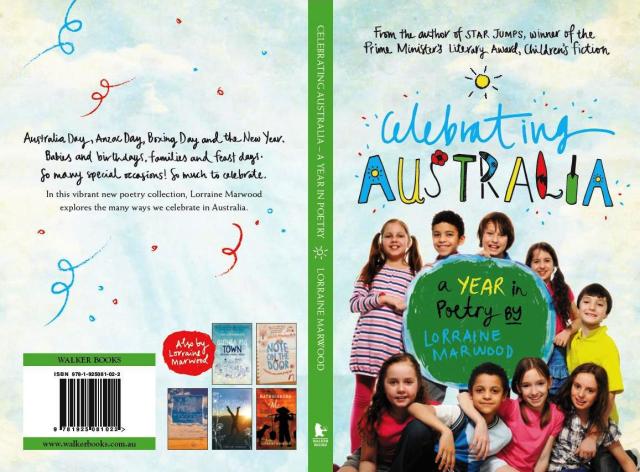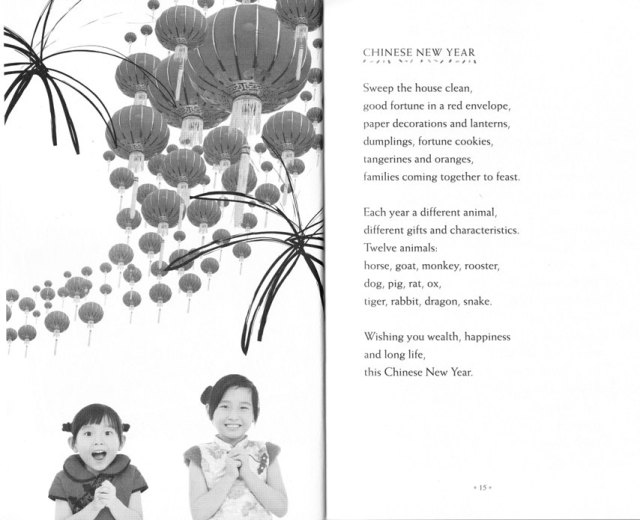Today I would like to welcome Lorraine as she launches her brand new poetry collection titled, ‘Celebrating Australia, a year in poetry’.
Lorraine is a force to be reckoned with in the world of poetry winning The Prime Minister’s Literary Award for her verse novel, Star Jumps in 2010. This is her third collection of poetry with Walker Books and I have to admit I’m a tiny bit jelly!
Anyhoo, on with the tour.
I asked Lorraine what makes a good poem because I think all us poets really want to know the answer to that question. Here’s what she said…
What makes a good poem?
Well I’m sure there are a lot of lists and ideas out in poetryland, but over many years of writing, judging, teaching I’ve come to regard several as top of the range and the sifting of gold from the perceived idea of what poetry is:
• the building blocks of poetry are nouns and verbs- names of things and action words, not prepositions or adverbs, but the solid power- impacting nouns and verbs
• details are important and help to banish ‘telling’ in poetry as well as banish cliché. After all a poem should provide the reader with a new slant, a new perspective on a slice of the known world.
• senses are another must in poetry, along with details they allow the reader full sensory delight, and call on a three dimensional perspective.
• a thread of common, shared history- a reader can say yes I’ve felt that way, I’ve experienced that but I’ve never looked at it in quite that way before.
In other words putting a bit of you in the poem- a feeling, a thought; will make the poem resonate and have more of an impact.
• a poem needs a title which is like an extra chance to wow your reader, don’t repeat a word or idea found in the body of the poem, in fact because poems are short explosive pieces of musical communication, don’t repeat any nouns or verbs you first introduced. Repetition except for format or emphasis, tends to dull the first power of those words.
• the end line of the poems should be satisfying, an ‘ahh’ conclusion, and be like a painting; circular, flicking us back to the title to again beginning the reading voyage.
And PS you don’t have to rhyme to have a lasting poetic presence- apologies to the host of this blog today.
Hmmpf, we’ll see about that!!
To help prove her point Lorraine asked that I write a non-rhyming poem (heaven forbid) using one of her poems as a template, actually all of the blog hosts have been given this challenge. Below are her instructions that you might like to utilise yourself.
Seasonal Celebration
Using a patterning from my seasons’ poems in Celebrating Australia to write your own poem.
Here is the poem ‘Autumn’ and the challenge is to write your own version either of autumn or substitute a celebration like a birthday, Christmas , a memory, a special day in the calendar that means something to you.
Below is my seasonal poem on autumn and for the remaining seasons in the book I followed the same patterning, of words, line breaks etc.
Read through this poem.
Autumn is loud crushing sounds
a foot scuffing rap-tapping shuffle.
One day a light dusting
of pathway obstruction
by week’s end a whole mound
of slip, slide, crunch, crackle.
Autumn is loud splashing colours
a yellow, rust, tangerine explosion.
One day a brightness in twos, threes
of pathway palette,
by week’s end a whole Monet mosaic
of buffs, shades, tints and silhouettes.
© Lorraine Marwood
Now chose your topic, remember the suggestions above.
• Brainstorm- if it’s autumn you choose: think colours, events, weather, your reaction to autumn.
Write all those words down- look up words to do with autumn, think of different words for yellow or brown- I love the word tangerine and have used it here. Poetry is unusual words that sound great and provide word pictures. Even look to photos, calendars, magazines; online for visual representations of your subject matter, you are trying to surprise and entertain your reader with a new perspective of a tried and true celebration.
• Now write the first line of my poem in your notebook. Pattern the words- for example:
Autumn is
Birthdays are
Celebration is
Christmas is
Holidays are
• Now add the sounds of your subject- three words only. And that’s the first line done.
• Second line actually goes into detail of the sounds of autumn (or whatever subject matter you’ve chosen), details are so important to the vibrancy of your poem.
a foot scuffing rap-tapping shuffle
• Again the same patterning.
Begin with ‘a’ then five words to make the musicality of the sound impact on the reader.
• Third line, so begin this line with ‘one day’, then add your four words
One day a light leafy dusting
• Fourth line ‘of pathway obstruction’. Here whatever you chose to flow on from the third line and it’s a line identifying place- where the sound is happening, will be used in the second stanza with just the last word changing. So it’s three words using ‘of’ as your beginning word.
• Fifth Line ‘by week’s end a whole mound’ this is a time frame line showing the change in autumn as it progresses with ‘by week’s end’ again repeated in the second stanza with the last three words different.
• Sixth line ‘of slip, slide, crunch, crackle’. So we are honing into the premise of the first line of ‘loud crashing sounds’ and providing a final explosion of sound (don’t repeat any sound words you’ve used before though)
• Now to the final stanza- same patterning but this time the focus is on colour.
How did you go?
Was it hard to write? Are you surprised by the results?
Actually Lorraine I’m very surprised by the results. Very surprised indeed. Here’s what I came up with…
The Bush is…
The bush is soft caressing sounds
a paw scuttle, a warm breeze rustle
One day a lush living haven
of grass trees and eucalypts
by week’s end an empty barren grave
of silent, echoes, staccato, fractures
The bush is soft calming colours
a blush, powder, emerald quilt
One day an ocean
of seaweed and coral
by week’s end a charcoal smeared canvas
of opal, mercury, oil and sky
The writing process…
To begin with I copy and pasted Lorraine’s poem into a new document and I bolded the parts that had to be included in my poem. If I’m going to follow instruction I like to be as accurate as possible. I like to get things right, it can be a personality trait that is a bit stifling at times.
I already knew that I would write about the bush because that’s where I spend most of my spare time. I walk through the bush nearly every day and many of my poems are found there. So choosing the topic was easy.
Being full of leaves and fallen branches I was aware that I could use similar words to Lorraine but for me the bush is like a warm hug, it’s not really crackly at all so I focused on the softness of it. It wasn’t until I began writing that it occurred to me to move from lush to burnt, something that can definitely happen by week’s end.
I really enjoyed searching for unusual words for sound and colour and without the limitation of rhyme, which I love, I was able to utilize more words.
I didn’t find it hard to write. I found it liberating.
But hmmm… I wonder if I could write it in rhyme?
As this exercise shows, Lorraine is not only a brilliant poet, she is also a wonderful teacher. Without her instruction I would never have been able to come up with my poem so now I challenge you…
The Challenge
Come up with your own Lorraine inspired poem (post it in the comments section below) and the one I fancy the most will receive a copy of her book. You have until the end of the blog tour (see dates below) to delight me.
Thanks so much for sharing your poetic thoughts with us Lorraine and before we go here’s another Celebratory Poem from her brand new wonderful collection.
BLOG TOUR DATES & LINKS
2nd March Jackie Hosking: Topic: What makes a good poem ( according to LM)
3rd March Kathryn Apel: Topic: Bringing a poetry collection together
4th March Rebecca Newman: Topic: Researching for poetry writing
5th March Claire Saxby: Topic: Inside this collection
6th March Janeen Brian: Topic: How you create for the creators: how you create ideas to excite children and adults to write poems of their own.









Poetry isn’t usually my thing but this sounded like a bit of fun, so here goes:
The Valley is…
The Valley is peace and serenity
quiet rain and calling birds
One day a haven of gentle winds
Playing through shimmering leaves
by week’s end a thrashing storm
of whipping, cracking, thunder, crash.
The Valley is muted morning colours
softly brushed with dusk, rose light
One day a patchwork
of sage and marigold
By week’s end a knotted blanket
of silver, slate, lead and pearl.
Cate Whittle
Beautiful!
Thank you 🙂
Guess what Cate? Being the only one brave enough to attempt this challenge you are the undisputed winner!! Well done and I’ll be in touch soon.
This was marvelously helpful – thank you both so much 🙂
Thanks Debra and I’ll look forward to seeing your poem for a chance to win a copy of Lorraine’s book! 😀
What a wonderful post! Looking forward to this poetry collection.
Oh Jackie! You’ve set a very high standard of poetry to follow! *slinks under the table*
Great post, Lorraine. I absolutely love your thoughts about what makes a good poem. I’ll be directing others here for sure – for years to come!
Oh you are too kind Kat – it just goes to show what a great teacher Lorraine is.
Thanks Jackie for a great start to the blog tour. I love that this is a writing tour also!
And Kat glad you enjoyed my version of what makes a good poem.
My pleasure Lorraine – thank YOU for asking me 🙂
Fabulous bush poem, Jackie. Bravo! I found it quite hard, very impressed with yours. Not posting mine here because — of course — I’ll be using it when the blog tour visits me tomorrow. 🙂
Congrats Lorraine on your gorgeous poetry book.
Hope your poems and tips inspire kids to read & write poetry …. Karen Tyrrell 🙂
Pingback: Research for poetry writers | REBECCA NEWMAN
Pingback: Celebrating Australia — with poetry! | Alphabet Soup